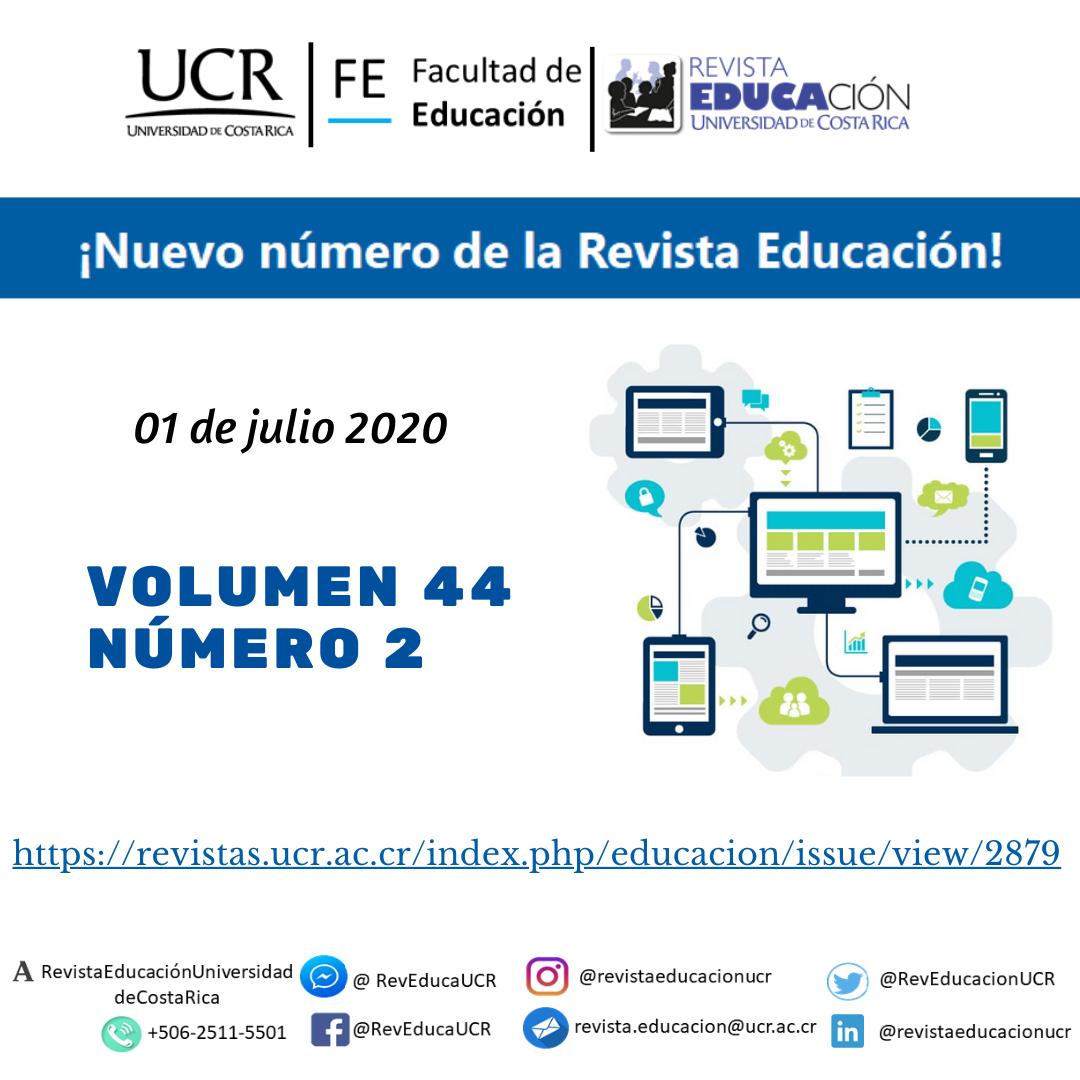Abstract
This article depicts teacher experience within the framework of the Educational Technology Learning Program [Protea] at the University of Costa Rica Department of Education as part of the program: Innovative Teaching: Leveraging on ICTs for Education which was the result of a collaborative effort during the 1st semester of 2017. The program is aimed at developing pedagogical experiences that leverage on digital technology for purposes of music education, specifically in a course on Musical Expression for Beginning Education Level II for Preschool Education majors. The objective of this article is to analyze teacher experience consisting of the design and development of an educational project that uses Maky Makey and Scratch. The project looks at how technology can impact how Music Education is taught and is, specifically directed at University of Costa Rica Preschool Education majors. The workshop consisted of 30 students enrolled in the course, Musical Expression FD-0173 for Preschoolers. A Project-Based Learning [PBL] methodology was used with a constructivist focus. Research consisted of reflections from the Protea staff regarding the contributions made by learning technology as well as the course instructor with regards to disciplinary expertise. Results focus on promotion of logical-mathematical thought, teamwork, problem-solving and linkages between technology and Music Education. For this purpose, students worked on a large array of proposals using educational material with different complexity levels for Preschoolers in order to facilitate assessment of possibilities and innovations both in Education and Technology.
References
Badilla, E. (2009). Diseño curricular: de la integración a la complejidad. Revista Actualidades Investigativas en Educación, 9(2), 1-13. Recuperado de https://bit.ly/34G2Sb9
Bajarin, T. (2014). Why the Maker Movement Is Important to America’s Future. TIME. Recuperado de http://time.com/104210/maker-faire-maker-movement/
Briceño, J., Cañizales, B., Rivas, Y., Lobo, H., Moreno, E., Velásquez, I. y Ruzza, I. (2010). La holística y su articulación con la generación de teorías. Educere, 14(48), 73-83.
Calleja, M., Luque, M. L., Rodríguez, J. M. y Liranzo, A. (2015). Incremento de la competencia lingüística en dos sujetos con Parálisis Cerebral mediante el dispositivo Makey Makey: Un estudio de caso. Revista de Investigación en Logopedia, 5(2), 112-134. Recuperado de https://revistas.ucm.es/index.php/RLOG/article/view/58622
Calvillo, A. (2014). Makey Makey y Scratch en el aula de música. España: Instituto Nacional de Tecnologías Educativas y de Formación del Profesorado, Observatorio de Tecnología Educativa. Recuperado de https://intef.es/wp-content/uploads/2019/02/MakeyMakey-1.pdf
Castillo, S. (2008). Propuesta pedagógica basada en el constructivismo para el uso óptimo de las TIC en la enseñanza y el aprendizaje de la matemática. Revista latinoamericana de investigación en matemática educativa, 11(2), 171-194. Recuperado de https://bit.ly/2oHhZO6
Collazos, C. y Mendoza, J. (2006). Cómo aprovechar el “aprendizaje colaborativo” en el aula. Revista Educación y Educadores, 9(2), 61-76.
Coob, P. y Yackel, E. (1996). Constructivist, emergent, and socio-cultural perspectives in the context of developmental research. Educational Psychologist, 31, 175-190.
Chaves, I., Esquivel, J., Jiménez, A. y Sánchez, H. (2017). Makey Makey y su posible aplicación en unidades de información. Revista E- Ciencias de la Información, 1(8), 1-16. Recuperado de https://bit.ly/34IeOJq
Díaz, G. (2008). Las TIC en el aula de música. Madrid, España: Universidad Autónoma de Madrid. Recuperado de https://bit.ly/30JzzTL
Dougherty, D. (2012). The Maker Movement. Innovations, 7(3), 11-14. Recuperado de http://www.mitpressjournals.org/doi/pdf/10.1162/INOV_a_00135
García, C. (2016). El aprendizaje basado en Proyectos y la pedagogía de la Bauhaus como modelos de innovación para el aula de educación Plástica, Visual y Audiovisual 4° de la ESO. (Tesis de maestría). Universidad Internacional de la Rioja, España.
García, A. y Gómez, V. (2017). Aprendizaje basado en Proyectos (ABP): evaluación desde la perspectiva de alumnos de Educación Primaria. Revista de Investigación Educativa. 35(1), 113-131. doi: https://doi.org/10.6018/rie.35.1.246811
Gluyas, R., Esparza, R., Romero, M. y Rubio, J. (2015). Modelo de educación holística. Una propuesta para la formación del ser humano. Revista Electrónica "Actualidades Investigativas en Educación", 15(3), 1-25. doi: doi: 10.15517/aie.v15i3.20654
Hernández, S. (2008). El modelo constructivista con las nuevas tecnologías: aplicado en el proceso de aprendizaje. Revista de Universidad y Sociedad del Conocimiento, 5(2), 26- 35.
Hutchins, E. (1995). Cognition in the wild. Cambridge, MA: MIT Press.
Ingenia. (2010). El valor de aprender. España: Escuela de Administración Pública de la Región de Murcia.
Jayahimsa. (2012). MaKey MaKey rendering (front). Recuperado de https://www.flickr.com/photos/49822796@N00/7167031572
Lozano, P., Guerrero, B. y Gordillo, W. (2016). Scratch y Makey Makey: herramientas para fomentar habilidades del pensamiento de orden superior. Revista Redes de Ingeniería, 7(1), 16-23. doi: https://doi.org/10.14483/udistrital.jour.redes.2016.1.a4
Maldonado, M. (2008). Aprendizaje basado en proyectos colaborativos. Una experiencia en educación superior. Laurus,14(28), 158-180. Recuperado de https://bit.ly/2uExCwr
Martí, M. y Ortega, J. (2008). Las TIC como recurso para el aula de música: una propuesta a través de la ópera. Recuperado de https://bit.ly/32AnMqR
Monclús, I. (2015). Scratch en la educación musical. Eufonía: Didáctica de la Música, (63), 74-81. Recuperado de https://bit.ly/2wkMopN
Ortiz, D (2015). El constructivismo como teoría y método de enseñanza. Sophia: colección de Filosofía de la Educación, 19(2), 93-110.
Pascual, J. y Johnson, J. (2005). A dialectical constructivist view of developmental intelligence. En O. Wilhelm y R.W. Engle (Eds.). Handbook of understanding and measuring intelligence (p. 177-201). Thousand Oaks, CA: Sage.
von Glasersfeld, E. (1995). Radical constructivism: A way of knowing and learning. Londres: The Falmer Press
Serrano, J y Pons, R. (2011). El Constructivismo hoy: enfoques constructivistas en educación. REDIE. Revista Electrónica de Investigación Educativa,13(1), 1-27.
Serrano J., y Pons, R. (2008). La concepción constructivista de la instrucción. Hacia un replanteamiento del triángulo interactivo. Revista Mexicana de Investigación Educativa, 13(38), 681-712.
Protea. (17de enero de 2017). Taller de exploración musical. Recuperado de https://www.youtube.com/watch?v=-ZWzdhoElPY
Protea. (27 de junio de 2017). Talleres Makey Makey. Recuperado de https://www.youtube.com/watch?v=I0e0d0KnT2w&t=20s
Silver, J. (2012). MaKey MaKey - An Invention Kit for Everyone. Recuperado de https://www.youtube.com/watch?v=rfQqh7iCcOU
Silver, J. y Rosenbaum, E. (2014). Makey Makey. Recuperado de https://www.moma.org/collection/works/187574







